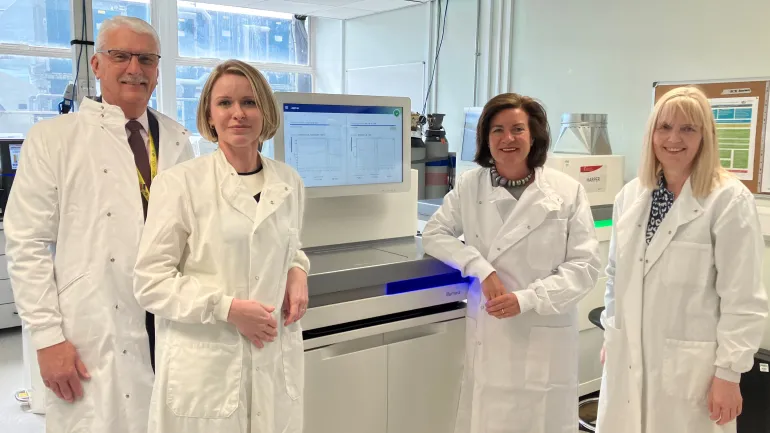
Lung cancer is the third most common cancer in Wales and the leading cause of cancer death. Most patients are diagnosed at an advanced cancer stage, often leading to very poor one-year survival prospects.
This project is evaluating the use of liquid biopsies within the lung cancer diagnostic pathway in Wales. A liquid biopsy is a simple and non-invasive alternative to surgical tumour biopsies done through a blood test. It can be collected early in the diagnostic pathway and provide genomic analysis, which is needed for implementing targeted treatments. This could speed up treatment decision making and let patients receive treatment more quickly, which could transform outcomes and improve survival rates.
The collaborative, known collectively as QuicDNA, has an extensive range of cross-sector involved partners and funders, with the project set to span multiple health boards across Wales.
Continued fundraising and investment into QuicDNA is essential to help make sure this technology can reach all corners of Wales and potentially transforms patient and clinical outcomes. Craig Maxwell, a lung cancer patient, has been a driving force in this and has raised hundreds of thousands of pounds to support the programme; all partners express our heartfelt thanks for his outstanding fundraising efforts and advocacy.
Find out more about QuicDNA and how your organisation can help invest resource and financial support into this ground-breaking evaluation in Wales. Email Andrew.hall@lshubwales.com for more information.
- Aneurin Bevan University Health Board
- Betsi Cadwaladr University Health Board
- Cardiff and Vale University Health Board
- Cwm Taf Morgannwg University Health Board
- Hywel Dda University Health Board
- Swansea Bay University Health Board
- All Wales Medical Genomic Services (AWMGS)
- Health and Care Research Wales
- Centre for Trials Research
- Cardiff University
- Bangor University
- Life Sciences Hub Wales
- Wales Cancer Network
- Welsh Gov
- Moondance Cancer Initiative
- Tenovus Cancer Care
- Amgen
- Illumina
- AstraZeneca
- Bayer
- Lilly
- Velindre Charity
Initial conversations begin
Discussion at the Welsh Cancer Industry Forum about the potential use of liquid biopsy technology in the lung cancer treatment pathway kick start the project.
Launch event
Stakeholders involved in the evaluation across healthcare, government and industry visit the Life Sciences Hub Wales office to meet and explore the project’s far-reaching potential.
Media coverage of QuicDNA launch
BBC Wales coverage highlights how liquid biopsies could help transform the lung cancer diagnosis pathway in Wales.
Insight into QuicDNA
Magda Meissner, Magda Meissner, a Clinical Liquid Biopsy Lead and Academic Medical Oncologist at AWMGS and Cardiff University, and Sian Morgan, Laboratory Director at AWMGS, share their thoughts on the programme and the impact it could have.
Fundraising bike ride from Cardiff to Paris begins
Craig Maxwell and 30 other riders start their four-day charity bike ride from Cardiff to Paris to raise money for QuicDNA. Visit his fundraising page to learn more.
Aneurin Bevan UHB set up as pilot
Aneurin Bevan UHB set up as pilot. Cardiff and Vale University Health Board (opened and joined the pilot in November 2023). 119 samples from ABUHB and CVUHB were analysed during pilot.
Fundraising for the QuicDNA project nears £1 million
Craig Maxwell’s efforts and generous support from the Moondance Cancer Initiative have seen the total amount reach £930,000. Read more on the BBC Wales website.
May 2024
Opened up in 4 remaining Health Board’s. Cwm Taf Morgannwg University Health Board, Hywel Dda University Health Board, Swansea Bay University Health Board, Betsi Cadwaladr University Health Board recruited for national roll out. (All Welsh Health Boards working within the cancer space, are now enrolled. Powys University Health Board currently doesn’t hold cancer services).
Moondance Cancer Awards
QuicDNA was awarded the accolade for Working with Industry and 3rd Sector in the Innovation and Improvement category, at the Moondance Cancer Awards.
July 2024
As of 16th July 2024, a total of 212 samples received from Health Board’s (from lung clinics and from medical hospital wards).
QuicDNA project rolls out nationwide in Wales
The QuicDNA study has now expanded to include four new sites: Cwm Taf Morgannwg, Hywel Dda, Swansea Bay, and Betsi Cadwaladr Health Boards. Read our news story to learn more.
Data collection 2024-25
Data collection and analysis commencing throughout 2024-2025.
This is an opportunity to significantly improve the lung cancer diagnostic pathway within Wales. The evaluation will look into the benefits of using liquid biopsies in people with suspected lung cancer.
Standard tissue biopsies can be painful and potentially cause complications. What’s more, if the biopsy doesn’t meet the quality or size required, a second or even third biopsy may be needed – further adding to a patient’s discomfort and extending the diagnosis time period. Liquid biopsies instead use a simple blood draw to obtain the genetic information needed to inform a patient’s treatment pathway.
This project is looking into whether its use earlier in the diagnostic process can improve and speed up diagnosis, reduce the time between diagnosis and treatment, and eventually inform how this technology can be rolled out to people with other types of suspected cancer. Partners will also evaluate economic costs and effects of liquid biopsy on the Welsh health system.
The evaluation will involve over 1,200 patients spanning multiple health boards in Wales.
Circulating tumour DNA (ctDNA), obtained from a blood sample, is shed from cancer cells into the bloodstream. It can be used to establish a cancer genome and support diagnosis and treatment planning without needing an invasive tissue biopsy.
